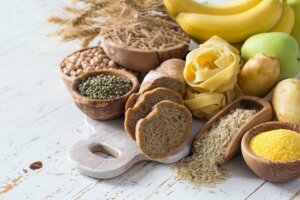Are Carbohydrates Addictive?

It’s clear that eating too many carbohydrates can cause certain problems. This is especially true when talking about simple sugars since they’re linked to diabetes and obesity in non-athletes. But, are carbohydrates addictive?
In recent years, articles have appeared linking regular and excessive consumption of simple sugars with certain types of serious illness. However, it’s very common to use carbohydrates in industry, especially sugar, as flavorings.
Furthermore, simple sugars can help to preserve foods and make them last longer. This is especially true for jams and preserves. But perhaps this sugar consumption is caused by some other factor, such as an addiction?
Are carbohydrates addictive?
The following article from the British Journal of Sports Medicine claims that sugar meets the required criteria to be considered an addictive substance. In fact, in animals, it’s been proven to produce typical drug effects such as tolerance, dependence, and opioid effects.
This effect happens in humans as well and so, sugar is therefore an addictive substance. It’s particularly important to be wary of your own tolerance levels, especially as the industry tends to use greater amounts of this food over time. We quickly become used to the taste and lose the ability to distinguish a product that’s too sugary.
Made up of glucose, this addictive property applies to carbohydrates too. However, simple carbohydrates are more harmful because they’re absorbed faster and produce greater stress on the pancreas.

It’s important to point out that sugar causes insulin to be released, which rapidly lowers blood glucose levels. This leads to post-mandibular hypoglycemia which increases appetite and increases the risk of consuming too many calories.
Artificial sweeteners as a replacement for carbohydrates?
In recent years, artificial sweeteners have become a popular substitute for sugar. One of the advantages is that they’re just as sweet, if not more so, but contain very few calories.
On paper, this could make them a great alternative for reducing sugar intake and thus reducing obesity. However, the reality is that the effects they have on insulin resistance are still unclear. There are disagreements in the literature that prevent us from making any concrete conclusion with the information available today.
Furthermore, we don’t know how safe they are in the medium and long term. We need more research on their effects on the body to demonstrate that they’re not linked to any complex diseases.
If carbohydrates are addictive, what’s the solution?
The main thing is to consume responsible amounts of sugar and, where possible, reduce it.
One good way to do this is to look at the labels on food products. Processed foods often contain excessive amounts of sugar that could be harmful. If you start reading each food label, you’ll be able to choose foods with less sugar.
Another way to reduce sugar consumption is to prioritize fresh foods over processed ones. Increasing your intake of fruits and vegetables will make a significant improvement in the quality of your diet.

Furthermore, such foods will also increase your fiber intake which will help reduce insulin resistance, as this article shows. They’ll also control your appetite better and make you feel fuller for longer.
In summary
Carbohydrates do meet all the necessary criteria to be considered addictive. We also know with certainty that consuming too much of them can be harmful to your medium and long-term health. For example, carbohydrates are linked to an increased risk of obesity and type-2 diabetes.
However, alternatives in the form of artificial sweeteners don’t appear to be the solution to this problem. We still need more studies to confirm their long-term safety.
Therefore, the best option is to consume sugar responsibly and in moderation. Reading labels and choosing products with lower sugar content is an excellent option. It’s also a good idea to incorporate more fruits and vegetables into your diet.
It’s clear that eating too many carbohydrates can cause certain problems. This is especially true when talking about simple sugars since they’re linked to diabetes and obesity in non-athletes. But, are carbohydrates addictive?
In recent years, articles have appeared linking regular and excessive consumption of simple sugars with certain types of serious illness. However, it’s very common to use carbohydrates in industry, especially sugar, as flavorings.
Furthermore, simple sugars can help to preserve foods and make them last longer. This is especially true for jams and preserves. But perhaps this sugar consumption is caused by some other factor, such as an addiction?
Are carbohydrates addictive?
The following article from the British Journal of Sports Medicine claims that sugar meets the required criteria to be considered an addictive substance. In fact, in animals, it’s been proven to produce typical drug effects such as tolerance, dependence, and opioid effects.
This effect happens in humans as well and so, sugar is therefore an addictive substance. It’s particularly important to be wary of your own tolerance levels, especially as the industry tends to use greater amounts of this food over time. We quickly become used to the taste and lose the ability to distinguish a product that’s too sugary.
Made up of glucose, this addictive property applies to carbohydrates too. However, simple carbohydrates are more harmful because they’re absorbed faster and produce greater stress on the pancreas.

It’s important to point out that sugar causes insulin to be released, which rapidly lowers blood glucose levels. This leads to post-mandibular hypoglycemia which increases appetite and increases the risk of consuming too many calories.
Artificial sweeteners as a replacement for carbohydrates?
In recent years, artificial sweeteners have become a popular substitute for sugar. One of the advantages is that they’re just as sweet, if not more so, but contain very few calories.
On paper, this could make them a great alternative for reducing sugar intake and thus reducing obesity. However, the reality is that the effects they have on insulin resistance are still unclear. There are disagreements in the literature that prevent us from making any concrete conclusion with the information available today.
Furthermore, we don’t know how safe they are in the medium and long term. We need more research on their effects on the body to demonstrate that they’re not linked to any complex diseases.
If carbohydrates are addictive, what’s the solution?
The main thing is to consume responsible amounts of sugar and, where possible, reduce it.
One good way to do this is to look at the labels on food products. Processed foods often contain excessive amounts of sugar that could be harmful. If you start reading each food label, you’ll be able to choose foods with less sugar.
Another way to reduce sugar consumption is to prioritize fresh foods over processed ones. Increasing your intake of fruits and vegetables will make a significant improvement in the quality of your diet.

Furthermore, such foods will also increase your fiber intake which will help reduce insulin resistance, as this article shows. They’ll also control your appetite better and make you feel fuller for longer.
In summary
Carbohydrates do meet all the necessary criteria to be considered addictive. We also know with certainty that consuming too much of them can be harmful to your medium and long-term health. For example, carbohydrates are linked to an increased risk of obesity and type-2 diabetes.
However, alternatives in the form of artificial sweeteners don’t appear to be the solution to this problem. We still need more studies to confirm their long-term safety.
Therefore, the best option is to consume sugar responsibly and in moderation. Reading labels and choosing products with lower sugar content is an excellent option. It’s also a good idea to incorporate more fruits and vegetables into your diet.
All cited sources were thoroughly reviewed by our team to ensure their quality, reliability, currency, and validity. The bibliography of this article was considered reliable and of academic or scientific accuracy.
- DiNicolantonio JJ., O’Keefe JH., Wilson WL., Sugar addiction: is it real? a narrative review. Br J Sports Med, 2018. 52 (14): 910-913.
- Suez J., Korem T., Zeevi D., Ziberman Scharpira G., et al., Artificial sweeteners induce glucose intolerance by altering the gut microbiota. Nature, 2014. 514 (7521): 181-6.
This text is provided for informational purposes only and does not replace consultation with a professional. If in doubt, consult your specialist.








